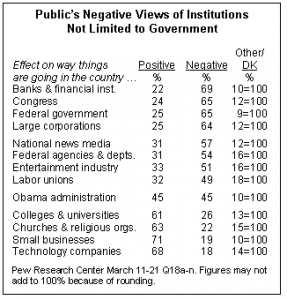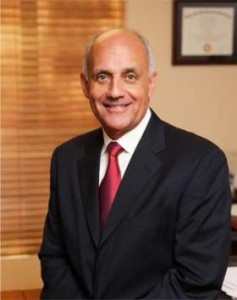 Felix Salmon has a worthwhile (but, IMO, partly mistaken) post on what he deems “the global crisis of institutional legitimacy.” I think he’s right to see this as a significant challenge to our current political economy.
Felix Salmon has a worthwhile (but, IMO, partly mistaken) post on what he deems “the global crisis of institutional legitimacy.” I think he’s right to see this as a significant challenge to our current political economy.
While watching another Arab government get toppled on Sunday evening — this time that of Muammar Gaddafi, in Libya — I was also reading George Magnus’s excellent note for UBS, entitled “The Convulsions of Political Economy”; you can find it chez Zero Hedge.
Convulsions is right — not only in the Arab world, of course, but also in Europe and the US. And the result is arguably the most uncertain outlook, in terms of the global political economy, since World War II ended and the era of the welfare state began.
As Magnus says:
It seems that we are having sometimes esoteric tiffs between Keynesians and Austrians about if and how governments should sustain jobs and growth. But, deep down, we are having a much more significant debate as we are being forced to redefine what we think about the rights and obligations of citizens and the State.
Most fundamentally, what I’m seeing as I look around the world is a massive decrease of trust in the institutions of government.
But I think Salmon makes two mistakes. First, he maintains an unwarranted distinction between the Arab Spring and the UK riots.
Where those institutions are oppressive and totalitarian, the ability of popular uprisings to bring them down is a joyous and welcome sight. But on the other side of the coin, when I look at rioters in England, I see a huge middle finger being waved at basic norms of lawfulness and civilized society, and an enthusiastic embrace of “going on the rob” as some kind of hugely enjoyable participation sport. The glue holding society together is dissolving, whether it’s made of fear or whether it’s made of enlightened self-interest.
From the perspective of the underclass in our society, it has been some time since “enlightened self-interest” counseled compliance. And from most perspectives, it’s clear that the elites, not the underclass, were the first to wave a huge middle finger at basic norms of lawfulness.
A more problematic error, though, is Salmon’s claim that corporations have retained their legitimacy.
Looked at against this backdrop, the recent volatility in the stock market, not to mention the downgrade of the US from triple-A status, makes perfect sense. Global corporations are actually weirdly absent from the list of institutions in which the public has lost its trust, but the way in which they’ve quietly grown their earnings back above pre-crisis levels has definitely not been ratified by broad-based economic recovery, and therefore feels rather unsustainable.
As a recent Pew poll shows, Americans are just as disgusted with banks and other large corporations as they are with their government.
While anti-government sentiment has its own ideological and partisan basis, the public also expresses discontent with many of the country’s other major institutions. Just 25% say the federal government has a positive effect on the way things are going in the country and about as many (24%) say the same about Congress. Yet the ratings are just as low for the impact of large corporations (25% positive) and banks and other financial institutions (22%). And the marks are only slightly more positive for the national news media (31%) labor unions (32%) and the entertainment industry (33%).
Notably, those who say they are frustrated or angry with the federal government are highly critical of a number of other institutions as well. For example, fewer than one-in-five of those who say they are frustrated (18%) or angry (16%) with the federal government say that banks and other financial institutions have a positive effect on the way things are going in the country.
But there are institutions that Americans still trust: colleges, churches, small businesses, and tech companies.
Distinguishing between those institutions (government and big corporations) people distrust and those (churches, small businesses, and tech companies) they do is important for several reasons. First, because it prevents us from assuming (as big corporations might like us to) that Americans will be content with corporatist solutions. People may or may not like the the post office, but there’s no reason to believe they like FedEx, Comcast, AT&T, or Verizon any more, particularly the latter three, which all score very badly in customer satisfaction. (Update: as joberly points out, Pew found that the postal service was by one measure the most popular government agency, with 83% of respondents saying they had a favorable view of the postal service.)
Such polling also suggests where Americans might turn during this convulsion. Barring Apple buying out the federal government, it seems likely Americans, at least, will turn to local institutions: to their church, their neighborhood, their local businesses.
That’s got some inherent dangers–particularly if people decide they want to change my governance with their church. But it also provides a nugget of possible stability amid the convulsion, one that might have salutary benefits for our environment and economy.
Apple aside, it’s the big institutions that have lost their institutional legitimacy. But we’re not entirely without institutions with which to rebuild.
 Well, okay, Richard Carmona has been formally announced for the race since early November of 2011, but with yesterday’s dropout by the only other major Democratic contender, former state Democratic Party Chair Don Bivens, the field is effectively cleared for Carmona.
Well, okay, Richard Carmona has been formally announced for the race since early November of 2011, but with yesterday’s dropout by the only other major Democratic contender, former state Democratic Party Chair Don Bivens, the field is effectively cleared for Carmona. 





